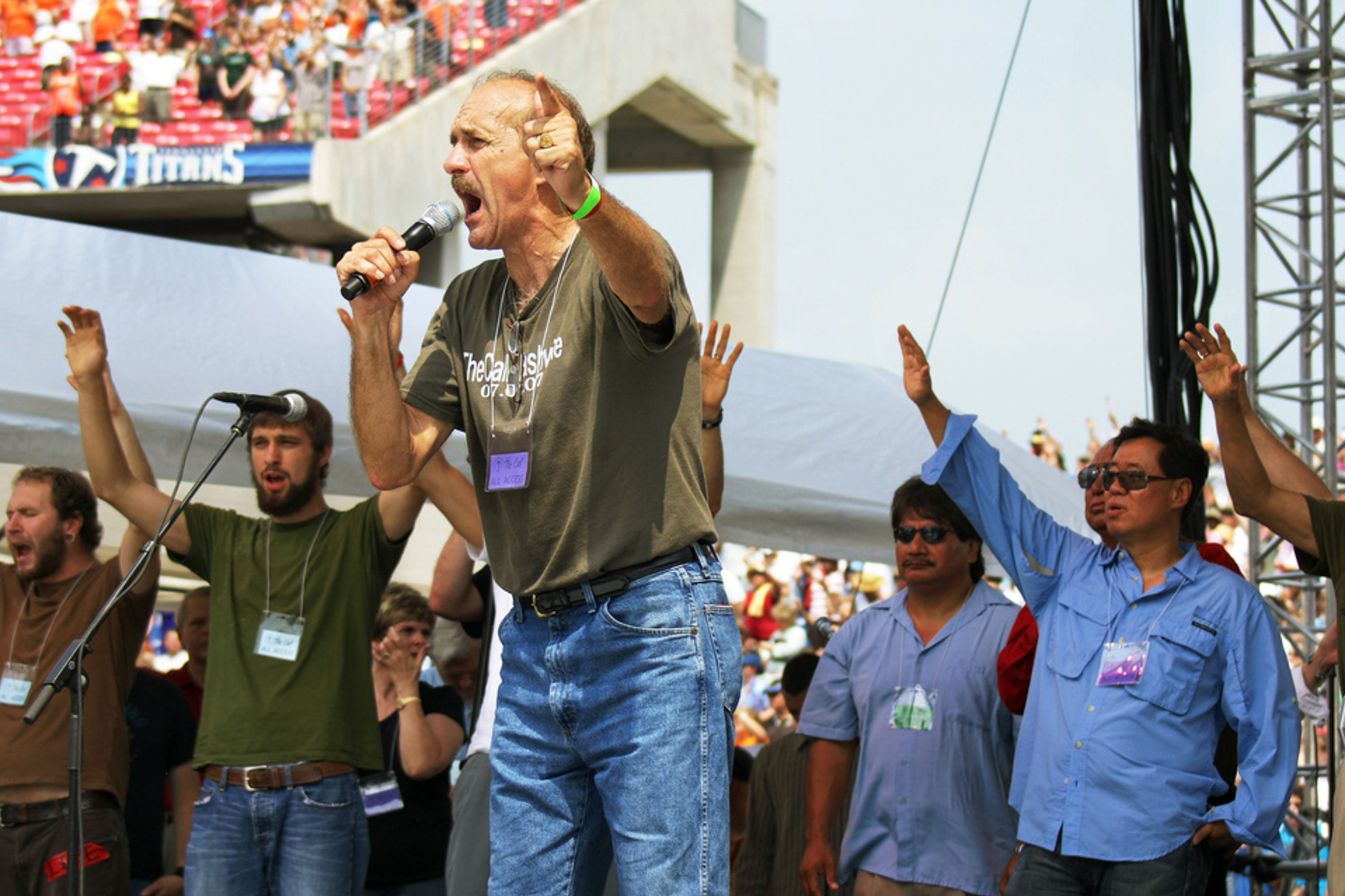This is the third part in our three-part series, “The Christian Dominionist War on Abortion.” You can read Part I here and Part II here.
Hundreds of young Mississippians and Alabamans knelt in a dark room, their foreheads to the floor and tears streaming down their faces as each mouthed inaudible prayers, a foreboding melody drowning out their voices. On the stage in front of them, violet lights illuminated the hair of musicians and ministers on the stage, save for a balding man with a thick mustache who squeezed his eyes and rocked back-and-forth as he spoke.
“This is the seed, if we will, it’s the seed of a revolution that can change America,” the man, Lou Engle, said. He was referring to the teens and preteens in the room, some of them mimicking his rocking movements in trancelike stupors.
It was 2006, and the preacher was speaking at The Ramp, a Christian youth ministry located in Hamilton, Ala., about 45 minutes east of Tupelo, Miss. Since 1998, the Alabama ministry has attracted youth groups from hundreds of churches in the region, hosting worship meetings and training seminars with the aim of “awakening a generation” that will “passionately pursue God’s heart to establish his kingdom on earth.”
Ending abortion is foremost among the young generation’s assignments, The Ramp teaches. While preaching at The Ramp in 2006, Engle compared ending Roe v. Wade to “overthrowing segregation in Alabama in 1963.”
“I want you to pray for your generation that it would be said in the future that a great generation came forth from the South and overthrew the altars of Ba’al, overthrew the altars of sexual immorality, overthrew the altars of abortion and brought forth the greatest awakening in the history of America,” Engle told the crowd.
‘We’re In A Massive War’
As a prominent figure in the right-wing Christian dominionist movement, Lou Engle teaches that the faithful must work to take control of the cultural levers, from the entertainment sphere to the judiciary. He did not respond to a request for comment for this series.
“We’re dreaming dreams of revolution, nothing less. … I’m not saying total dominion. I’m saying when Christ returns it will be total dominion, but until then we’re in a massive war in establishing the kingdom and learning to rule right now as kings and priests with Christ,” he told the young audience at The Ramp in 2006.
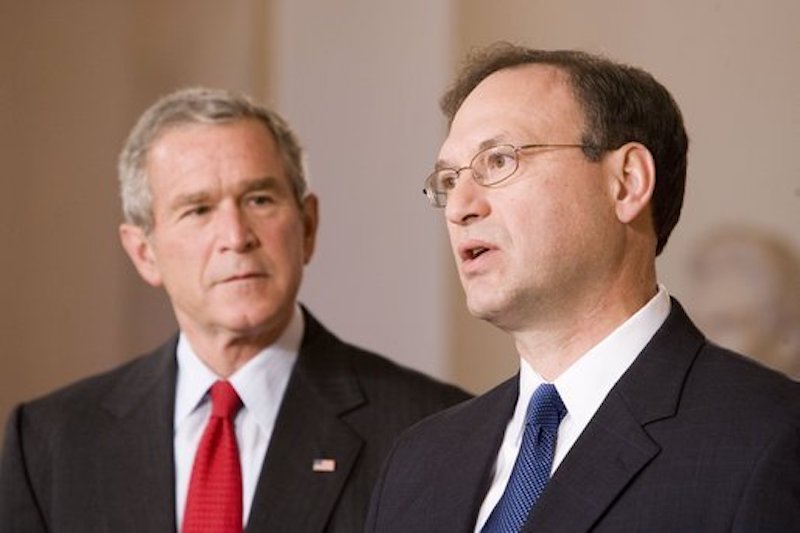
That year, Republican President George W. Bush appointed Justice Samuel Alito to the U.S. Supreme Court to replace outgoing Justice Sandra Day O’Connor, the first woman to ever serve on the nation’s high court. With his history of opposing Roe v. Wade, the landmark 1973 U.S. Supreme Court ruling that declared abortion a right, Alito won plaudits from anti-abortion Christian activists who had backed Bush. Years earlier, in 1992, O’Connor had joined a 5-to-4 majority to uphold abortion rights in Planned Parenthood v. Casey.
With Alito on the court, the anti-abortion side still did not have a majority, however. After the 1992 ruling, President Bill Clinton had replaced one of the anti-abortion justices, Byron R. White, with feminist Justice Ruth Bader Ginsberg. Alito’s appointment meant that the court once again featured four anti-abortion justices, but remained one shy of a majority. With the election of Donald Trump a decade later, though, Republicans finally gained an opportunity to appoint an anti-Roe majority as he replaced three justices, including two who had voted in the past to uphold abortion rights, with more conservative successors.
Throughout the Trump presidency, Christian dominionists and right-wing legal organizations pushed him to appoint anti-abortion judges. The Alliance Defending Freedom, a legal organization, set the stage for a case challenging Roe v. Wade at the U.S. Supreme Court by working with Mississippi lawmakers to pass a 15-week abortion ban. ADF did not agree to an interview for this series, saying in a pre-written statement that it ‘worked with legislators in Mississippi to protect life because, at the end of the day, life is a human right.”
When Justice Ruth Bader Ginsberg died weeks before the 2020 election, Engle called it a “prophetic” moment that could herald “the beginning of the end of abortion.” For many court observers, the December 2021 Supreme Court hearings over Mississippi’s abortion law in the Dobbs v. Jackson Women’s Health Organization case seemed to confirm that prediction.
But Frederick Clarkson, a senior research analyst at Boston think-tank Political Research Associates and an expert on Christian dominionism, told the Mississippi Free Press that he has seen this moment coming for a long time.
Christian dominionists, the researcher said, “understood what they were up against” in the battle against abortion. They began building institutions, rearing leaders, collecting donors, crafting philanthropies and creating media outlets they needed to “prevail in their revolution.” National mainstream media and political leaders have been slow to understand what has happened and even slower to respond in equal measure to counter it, he said.
“My colleagues and I, we have Cassandra syndrome,” Clarkson continued, referring to the figure from Greek mythology who was cursed with the ability to see future catastrophes—a curse that also ensured no one would believe her warnings until it was too late.
But with a U.S. Supreme Court decision that could devastate abortion access in much of the country looming, progressive religious figures who support abortion rights are working together to plot a path forward and to combat the power of the Christian right on the cultural battlefield.
‘Speaking the Language of Faith’
On the steps of the U.S. Supreme Court on Dec. 1, 2021, Catholics For Choice President Jamie Mason spoke before the mixed crowd of abortion-rights supporters and opponents who had gathered on the day of the Dobbs hearings.
“There is no secular anti-choice movement. It is led by fringe zealots who want to make abortion impossible to access,” she said, waving her index finger in the direction of anti-abortion activists who were attempting to drown her out with bullhorns.
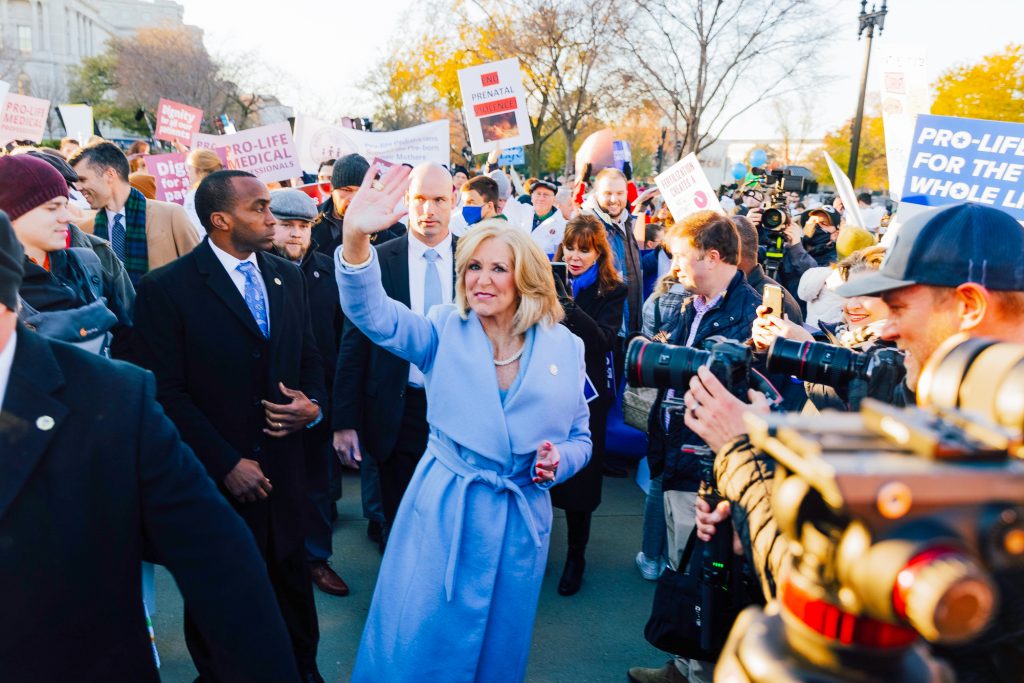
“As a Catholic, I am well aware that we are fighting a right-wing religious ideology borne of white men who are desperate to control the bodies of women, trans, non-binary and queer people because they have a desperate need to limit our freedom, our equality and our power. I support abortion access because of my faith, not in spite of it. My faith teaches that health care is a human right—and that includes abortion.”
Abortion laws like Mississippi’s 15-week ban, Mason argued, “affect people who are already broken and crucified by the sinful structures of systemic racism, gender inequality, economic insecurity and immigration restrictions.”
In January during The SACReD Gathering, a virtual conference including religious leaders who support abortion rights, Mason recalled the crowd’s reaction as she spoke outside the Supreme Court.
“If you know someone who was there, you know how intimidating that scene was because there were very radicalized, very emboldened anti-choice voices that were spewing a lot of the most venomous, misogynistic rhetoric I have ever heard, and they were trying to drown us out,” she said. “I was one of the few people of faith that spoke at that rally, and when I spoke, I was speaking the language of faith.
“And for a couple minutes, I shut them up because they didn’t know what to do. It showed me the power and the crucial role that faith voices have in this fight to take back the narrative from this white supremacist, Christian nationalist, anti-feminist movement and to reclaim the moral high ground that we deserve.”
White supremacist groups have long opposed abortion—at least for white women. In the 19th century, anti-abortion sentiment grew among white Anglo-Saxon Protestants in reaction to the arrival of Irish and Italian Catholic immigrants, who they did not consider white at the time. White supremacists feared that, with their large families due Catholicism’s opposition to contraception, the Catholic immigrants would demographically overtake white Protestants.
Since 2017, the Texas-based Patriot Front, a white nationalist group, has taken part in the annual anti-abortion March For Life. Last month, March For Life President Jeanne Mancini said her group condemns “any organization that seeks to exclude a person or group of people based on the color of their skin or any other characteristic” because they are “counter to our mission which recognizes that all human lives are equal from the moment of conception: equality begins in the womb.”
In 2019, a Pew Poll found that 68% of American Catholics believe Roe v. Wade should not be overturned; 70% of all Americans agreed. But although Mason’s beliefs are in line with the vast majority of those who claim her faith tradition, the church hierarchy and its official teachings maintain an explicitly anti-abortion ideology. The Catholic church’s anti-abortion teachings predate even the rise of the evangelical anti-abortion movement, which began in earnest only after Roe v. Wade.
“You cannot overstate how powerful the Roman Catholic Church has been over anti-abortion politics in this country,” Mason said during the SACReD conference. “They started on this before Roe. They realized there was movement. State-by-state, there started to be more liberalizing abortion laws, so in the late 1960s, they started studying this issue.
“And so later on, in the 1970s, evangelicals thought, ‘Wow, that’s really effective.’ Evangelicals couldn’t do segregation arguments any more, and they had defeated the (Equal Rights Amendment), so abortion became the pivot, and they played this very succesful long game. But ultimately, it’s Catholic ideology we’re fighting against—these notions of when life begins and personhood and life beginning at conception.”
Mason’s Catholics For Choice organization and its efforts have not gone unnoticed by church leadership.
“We were called diabolical by an archbishop. We were called Judas by the cardinal of Washington, D.C. We were criticized by some progressives,” she said. “And we also got such expressions of gratitude from Catholics who do not feel seen at all.”
‘Caught Flat-Footed’
The two-day virtual SACReD gathering drew about 450 people from diverse religious backgrounds who united in their support for abortion rights. SACReD’s lead organizer, Rev. Angela Williams, a Presbyterian minister, told the Mississippi Free Press on Feb. 15, 2022, that the goal is “to build infrastructure” and “take back the public square” from white evangelicals who dominate religious discussions about abortions.
“I think a big factor in all of this is that the progressive movement and progressive people of faith were just caught flat-footed and were always in more of a defensive stance,” she said. “So we are in a defensive stance, but now we are taking proactive action to be supportive and care for people in our communities who deserve access to abortion care, who deserve access to health care and who deserve to make the decisions that are best for them and their families free from shame, judgment, stigma and state-sanctioned violence.”
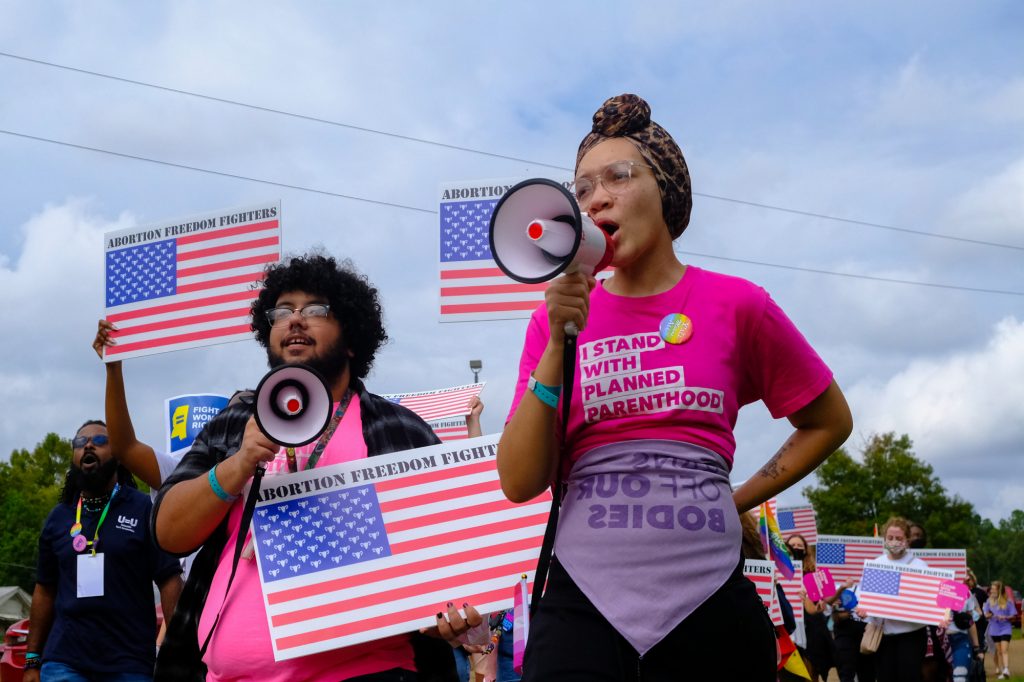
Williams said she and others in SACReD are drawing inspiration from “lessons we learned in the LGBTQ and faith movement.” She described the U.S. Supreme Court’s 2015 Obergefell v. Hodges decision, which ended state bans on same-sex marriage, as “a great watershed moment.”
“I think there were a lot of folks who were like, ‘How did this happen so quickly?’ But we credit a lot of that to the power of faith communities to really change the culture on this,” she said. “So we look to those movements. How did people change their minds on it? It wasn’t by battling scripture or making a really good theological argument. It was based on relationships and saying, ‘Oh, my kid’s gay. My cousin’s gay. And I love them and raised them in church. And I taught them in Sunday school.’
“So how do we learn from those lessons and do the same kind of movement building, the same kind of narrative shifting, the same of kind of stigma busting in and around abortion? … At the heart of it, we’re holding a space for people to weave together their faith story and their reproductive story and see that as a good.”
But while Mason, Williams and others are pushing for greater openness about abortion and reproductive issues in faith communities, the topic still remains taboo in many religious spaces. During the SACReD conference, Dr. Pamela L. Davis, a researcher and the director of the women’s ministry for Pineview Church in Ypsilanti Township, Mich., described conversations about abortions with women from Black pentecostal churches like the one she herself had grown up in. The women reported “shaming practices,” she said.
“They had stories about unmarried women who were discovered to be pregnant and stood before the congregation—not the guys, the girls—and made to disclose their pregnancies, stripped of any position in the church,” Davis recalled. “They were ostracized, criticized and didn’t receive any support, so no baby showers for these girls. Their friends were told not to associate with them because they were loose, and they didn’t want that looseness to rub off on them.”
The conversations, she said, highlighted the need for churches and other religious institutions to offer a place for people to be able to have conversations, seek counsel and seek emotional support about reproductive issues.
“I was given a number of reasons for abortions. Economics and timing at the top, but unanimously, each of the women indicated that the reason their abortions was to avoid the shame, the condemnation, the ostracism and the treatment she would receive if she disclosed her pregnancy to church members and church leadership. …
“It’s astounding to me that they never blamed God. In fact, they believed God had forgiven them. They also believed the church never would. So they suffered in silence.”
‘No Compulsion In Religion’
During one SACReD session on Jan. 25, 2022, Sahar Pirzada, a Pakistani-American Muslim and social-justice organizer in Los Angeles, cited the importance of boosting discussions about abortion and reproductive health in Muslim communities. She is the West Coast Programs Manager for HEART, a nonprofit that focuses on issues surrounding sexual violence and sexual health in Muslim communities.
A 2017 Pew poll found that 57% of Muslim Americans believe abortion should be legal in all or most circumstances. But Christian views on abortion have influenced the way some Muslims approach the issue, Pirzada said.
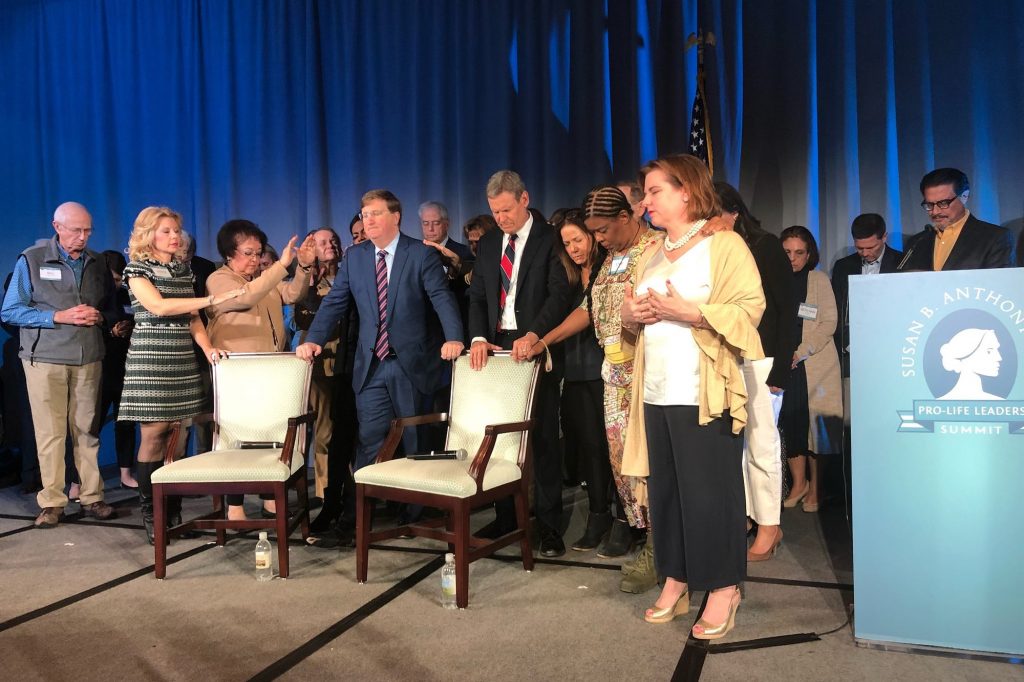
“We made it a point to name Christian hegemony, Christian supremacy and the impacts of colonialism on the ways that Muslims sometimes think about abortion even if they aren’t saying it out loud,” she said. “So I think part of the work is naming it for non-Muslim communities like, ‘Hey, this really screwed it over for us because we didn’t have this issue necessarily before.’ And also talking to Muslims to remind them of the impact of colonialism and Christian hegemony.”
During a separate SACReD panel, Muslim Women’s Organization Chaplain Amany Shalaby said that beliefs about abortion vary among Muslims, with some scholars saying abortion is permitted up until 120 days gestation and others saying it is only permitted up to 40 days. She noted that at least nine Muslim-majority countries have more permissive abortion laws than Alabama: Tunisia, Kuwait, Bahrain, Turkey, Morocco, the United Arab Emirates, Jordan, Qatar and Saudi Arabia.
“There shall be no compulsion in religion,” Shalaby said. “I cannot impose on anyone my own beliefs or my religion or my interpretation of the religion I belong to. So really, in my personal opinion, it should be left to the woman herself and the physician, and it should not be imposed by a state law. So that is my conclusion from my studies and all the studies I’ve heard.”
But several of Mississippi’s top leaders have repeatedly signaled their willingness to use state power to implement their religious beliefs. On Feb. 15, Gov. Tate Reeves spoke at the Susan B. Anthony List’s Pro-Life Leaders Summit in Kiawah Island, S.C., where attendees prayed for him.
“Together, we’re going to save millions of babies and ensure expecting mothers receive the quality care they deserve,” tweeted Reeves, whose state boasts the nation’s highest infant and fetal mortality rates and worst health-care outcomes.
During Mississippi’s 2019 elections, the Susan B. Anthony List endorsed Republican Lynn Fitch in her bid to become Mississippi’s first woman attorney general and donated $2,000 to support her campaign. The group cited her anti-abortion views in its endorsement, saying it was “dedicated to ending abortion by electing national leaders and advocating for laws that save lives, with a special calling to promote pro-life women leaders.”
Last year, at the Susan B. Anthony List’s Pro-Life Leaders Summit’s 2021 Leadership Summit, SBA List President Marjorie Dannenfelser introduced former President Donald Trump as a speaker, calling him “the most pro-life president in history.” She praised him for following through on his 2016 vow to appoint U.S. Supreme Court justices who would overturn Roe v. Wade.
“He consulted with us about who should be in what position from the pro-life perspective, especially on the courts,” Dannenfelser said. “This is a man whose commitment to the movement is unmatched. We’ve had great pro-life presidents before, but no one operated like this one.”
On Dec. 1, 2021, hours after Mississippi Solicitor General Scott Stewart argued before the U.S. Supreme Court and asked the justices to overturn Roe v. Wade, Fitch proclaimed that her office had pursued the Dobbs case “because God selected this case.” When the court issues its ruling in June 2022, she predicted, “we’re going into a new world, post-Roe v. Wade.”
‘Religious Freedom Is Not About Religion’
Frederick Clarkson, the Christian dominionism expert, acknowledges that Roe v. Wade’s days are likely numbered because of the changes Trump made to the U.S. Supreme Court. Speaking during the SACReD gathering on Jan. 26, he urged progressive people of faith who support abortion rights to focus on institution-building.
In an interview with the Mississippi Free Press, he said progressive people of faith must also work to reclaim the mantle of religious liberty from right-wing evangelicals and Christian dominionists.
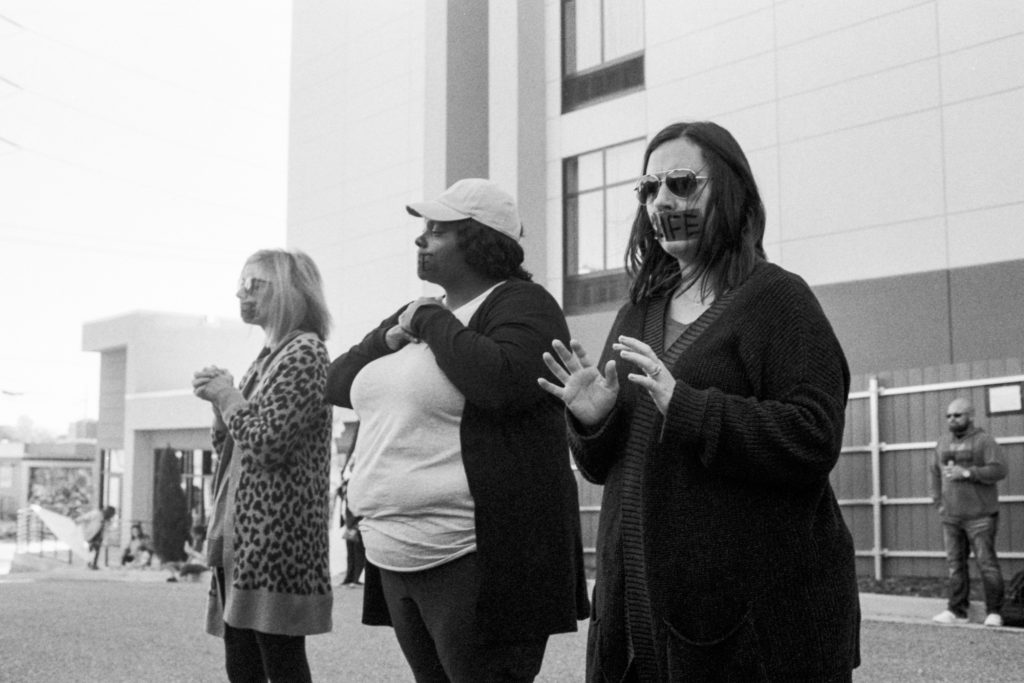
“The first thing we need to do is to understand what religious liberty is and what it’s not. You have to embrace it as a fundamental value of democracy; I would argue there is no democracy without it,” Clarkson said. “Because religious freedom is not about religion. … It’s up to you to believe what you will or to change your mind free from the undue influence of powerful governmental or religious institutions.”
Without “the principles of religious freedom, pluralism and separation of church and state, … there is no free speech,” Clarkson said. “You have to be able to believe differently than the rich and the powerful, because if you can’t do that, you can’t speak freely.”
“I would say that is the most conservative, the most moderate and the most radical, revolutionary idea that we have that’s a part of our history and that’s a basis of our democracy,” he continued. “It’s conservative in the sense that we’re preserving democratic values, moderate in the sense that it’s something we want to carefully and graciously shepherd and conserve, and it’s radical in the sense that it’s always a threat to powerful interests and concentrations of power.
“If people can’t believe differently than the billionaires and theocrats, then we have the same situation that we had in the middle of the 18th century. The other side that’s trying to claim the mantle of the American Revolution? I would say it’s not theirs to claim. Right now, we still have vital institutions of democracy that are resilient and worth preserving and improving on. If we want those improvements, we have to preserve them and learn how to fight back for the most profound democratic values that exist.”
‘A Huge Imbalance’
During the SACReD Gathering on Jan. 26, Columbia Law School’s Law, Rights and Religion Project Director Elizabeth Reiner Platt explored the intersection of reproductive rights and religious liberty, including in the First Amendment, which preserves both the free exercise of religion and makes it clear that government officials cannot use their positions to impose and establish their own personal religious beliefs.
“Right now, the doctrine of the free-exercise clause is in a time of flux,” she said. “It’s going through this rapid change under an extremely conservative Supreme Court. She noted that the U.S. Supreme Court has sided with conservative Christians in a number of “religious freedom” cases over the past decade.
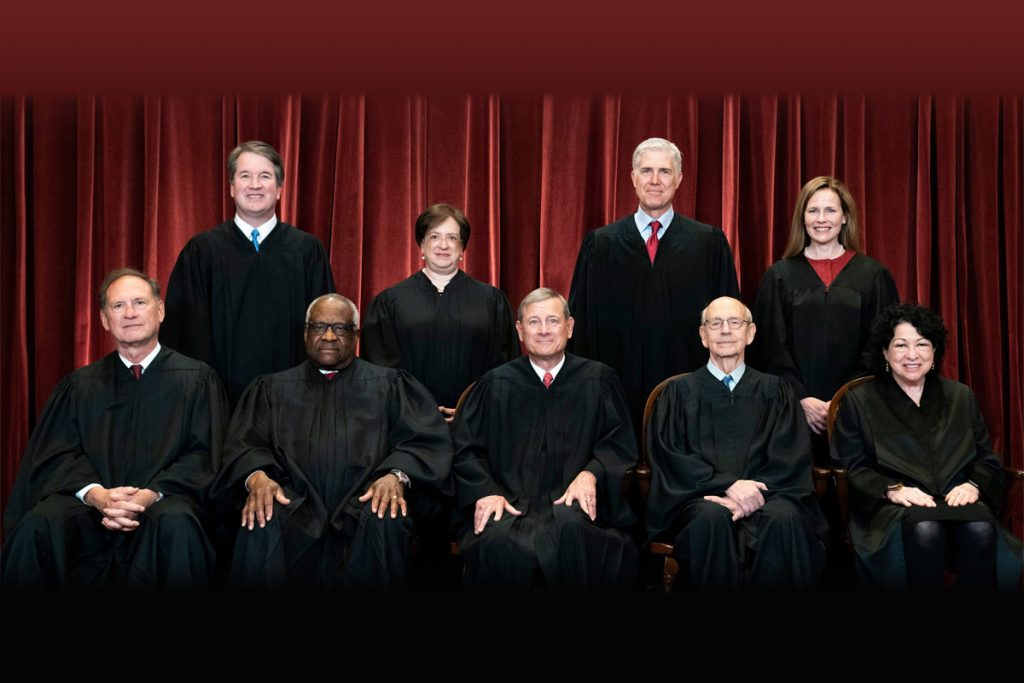
In 2014’s Burwell v. Hobby Lobby, for instance, the court agreed that corporations can refuse to give employees health coverage that includes contraception based on the owners’ religious beliefs. The ruling cited the 1993 federal Religious Freedom Restoration Act, which Congress passed with support from liberals who believed at the time that it would protect religious minorities.
“Far-right Christian activists have completely reframed our understanding of the Religious Freedom Restoration Act, but also religious freedom more generally,” Platt said. “They have just captured the entire dialgoue around religious liberty to prefer the protection of conservative religious beliefs about sex, marriage and reproduction.”
Platt pointed to medical-refusal laws like those in 46 states, including Mississippi, which allow health-care providers to refuse to provide abortion care based on their moral or religious beliefs. But those laws only work in one direction, Platt said.
“Let’s say you have a doctor who is a member of the National United Church of Christ, and they feel morally obligated to provide comprehensive reproductive care, but they work in a Catholic hospital,” she said. “That doctor can be fired if she goes ahead and performs an abortion in accordance with her religious beliefs. She can’t rely on that conscious clause law to protect her from being fired by the Catholic hospital.
“But let’s say you have the reverse. Let’s say you have a conservative Christian doctor working in a Jewish hospital where abortion is permitted. That Jewish hospital is not allowed to fire the doctor if they refuse to provide abortion care, and if they do fire that doctor, he can look to that conscience clause for protection.”
Platt called that “huge imbalance” a “violation” of the Constitution’s Establishment Clause, which prohibits the government from favoring or disfavoring a particular religion.
“The government shouldn’t be in a position where it’s deciding what theological beliefs to favor or not, but I do not imagine the current Supreme Court would agree with me on that one.”
‘A Voice For Jewish People’
Nine days after the Dobbs hearing, on Dec. 10, 2021, the U.S. Supreme Court declined to temporarily block enforcement of Texas Senate Bill 8, which allows residents to file civil suits against anyone who “aids or abets” someone in obtaining an abortion beyond six weeks gestation.
The decision effectively forced abortion clinics in Texas to stop offering their services to most pregnant people, leaving them with no choice but to travel across state lines to obtain abortion care. It also allows residents to sue anyone suspected of helping another obtain an abortion. Rabbi Kelly Levy of Congregation Beth Israel in Austin, Texas, told the Mississippi Free Press that the law infringes on her religious exercise.
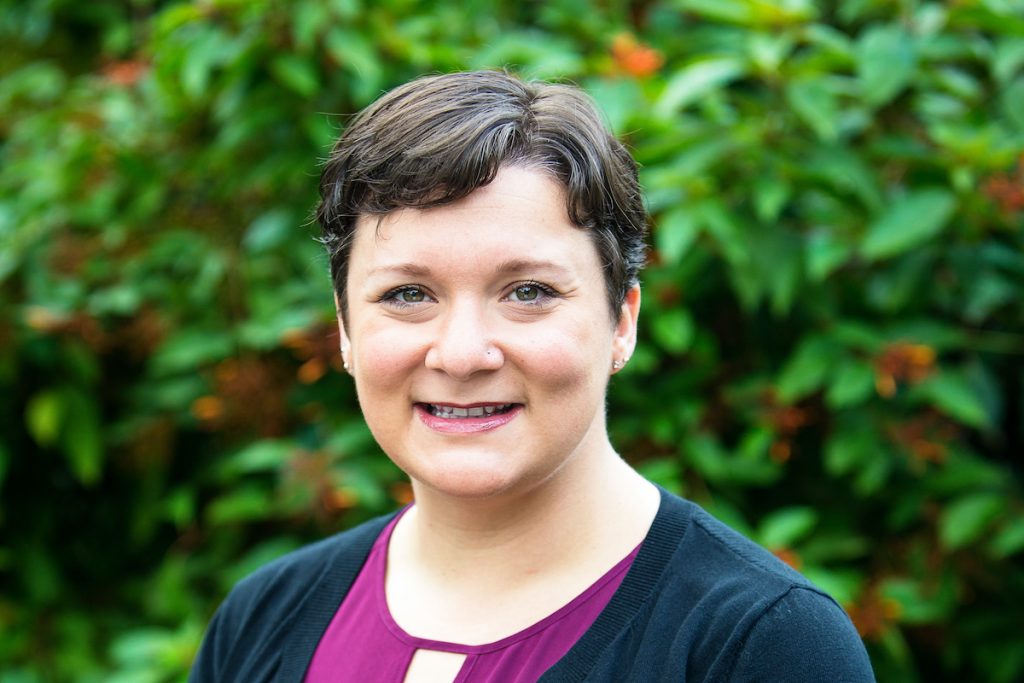
“My faith, Judaism, is in firm support of abortion, abortion access and reproductive rights,” she said. “So to tell me that abortion is illegal and to limit and restrict access to it in fact denies my freedom of religion. This is not, contrary to what a lot of people think, a Christian country. This is a country full of religious beliefs and practices and denominations and ideas and values and ideologies, and by limiting rights you are limiting our right to our faith.”
Unlike Christianity and Islam, there is little debate over the morality of abortion in Judaism. During one SACReD session, Rabbi Danya Ruttenberg of the National Council of Jewish Women noted that “certain ultra orthodox Jews have gotten in bed with American evangelicals for political reasons,” but the 2017 Pew Poll shows that about 83% of American Jews support abortion rights. White evangelicals, meanwhile, opposed abortion by a 77%-to-20% margin, Pew found in 2019, and anti-abortion leaders like former Mississippi Gov. Phil Bryant often compare abortion to the Holocaust.
“For thousands of years, Judaism has upheld the access and right to an abortion. And in fact, in certain situations, our faith actually demands an abortion because Judaism prioritizes the health and safety of the person who is pregnant,” Levy said. “When we deny that access to the pregnant individual, we deny our thousands of years of tradition. The rabbis of many, many years ago were clear that abortion is something we are required to give to people in necessary moments.
“The value of pikuach nefesh, which means preserving a life, is about preserving the life that is already in existence—the life of the pregnant person. The rabbis also agreed that life begins at first breath, not a conception, which is different from Christian theology and instruction. So as Jews, we believe firmly that the fetus is not actually the priority in these situations—it’s the physical and emotional well-being of the pregnant individual.”
The weekend following the SACReD gatherings, more than a thousand Jewish rabbis and other religious leaders at synagogues across the country participated in Repro Shabbat, sharing messages about reproductive issues and the need to speak out in support of abortion rights.
“The law in Texas denies my ability to provide support to people. I can always provide pastoral care, but sometimes pastoral care looks like helping someone acquire a necessary medical procedure like abortion,” Levy said.
The Austin rabbi said that she has counseled people in the past about their reproductive options and even helped transport some to an abortion clinic for care. While no one has come to her for help regarding abortion since S.B. 8 took effect, Levy said she would not turn someone away even if it puts her in legal jeopardy.
“I will always provide pastoral care to anybody in need. And if that pastoral care extends to helping somebody obtain an abortion across state lines, I will do anything I can to provide that support,” she said.
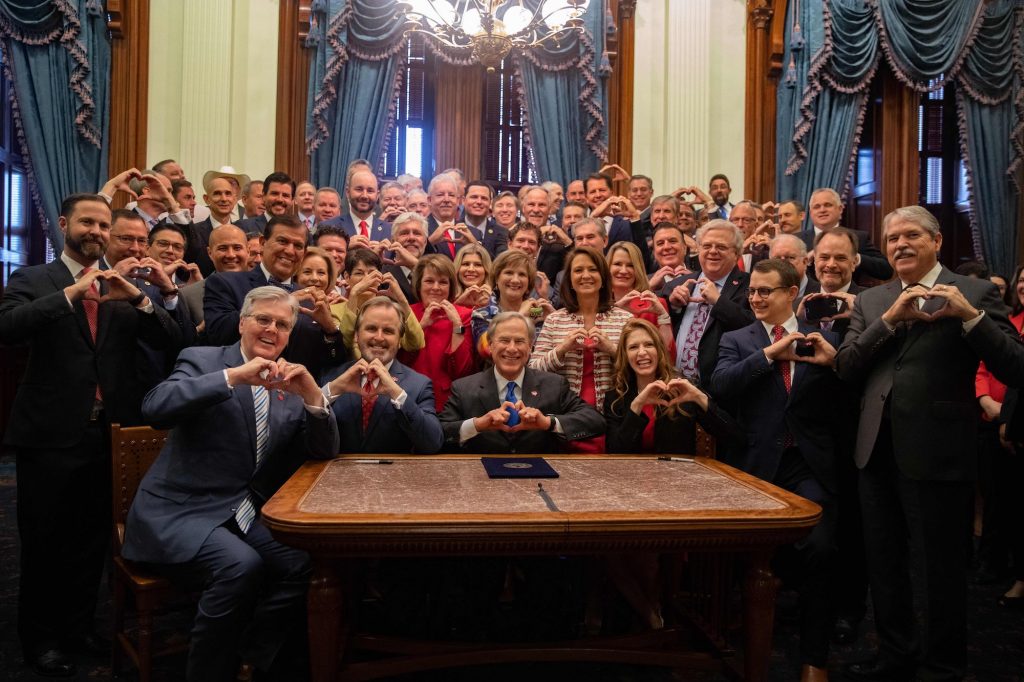
In October 2021, the National Council of Jewish Women launched 73Forward with a focus on promoting “abortion justice” and fighting back against the cultural narrative that centers anti-abortion religious ideas. The organization, which spearheaded Repro Shabbat, is also advocating for federal legislation that would protect abortion rights nationwide even if Roe v. Wade is overturned in addition to bills to make at-home abortion medication easier to obtain.
In the past, Jews have not made it a priority to organize around abortion rights en masse, Levy said, but that has changed as the danger to reproductive rights has come more clearly into focus.
“So much of the conversation has been focused on Christian efforts to suppress abortion, so it felt like there wasn’t a voice for Jewish people. But we now recognize that not only do we need to have a voice in this, but we probably need to be the leaders in this effort,” she said.
“… As I’ve said, we are firm supporters and believers that abortion access is a necessity in life, and we have always supported abortion access from the beginning of Judaism, and so it makes sense for people who for thousands of years have supported this to be at the forefront of this fight. And second, I would say Jews and social justice work have gone hand-in-hand for decades and we have often taken the reins when it has come to social justice and so we should do it now, too.”
‘It’s Already Happening In Texas’
Progressive people of faith “have to prepare” for the reality that the U.S. Supreme Court could overturn Roe v. Wade in the coming months, Rev. Angela Williams told the Mississippi Free Press.
“Because you know, it’s already happening in Texas,” she said.
Williams moved from Texas to Arkansas in mid-2021, before S.B. 8 took effect, but said she is still witnessing and helping deal with the fallout from the bounty-like abortion law.
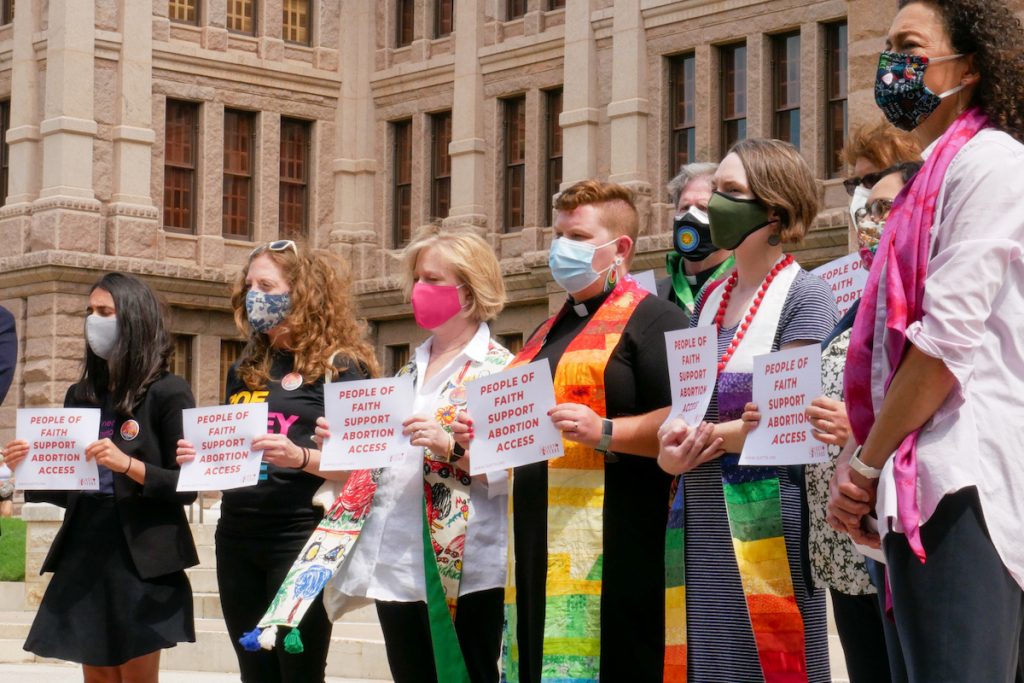
“I’m not in Texas, and I’m still fielding texts from people who need abortions in Texas. I’m getting 11 p.m. texts saying, ‘Hey, there’s an underage person who doesn’t have parental consent and doesn’t speak English very well. Where can they go to get an abortion?’” she told the Mississippi Free Press.
“… A friend of mine just gave birth in Texas and the whole second half of her pregnancy was while S.B. 8 was in effect, and she was like, ‘Even my OB-GYN would not be able to give me the care that I need if something happened, God forbid.’ It really obstructs health care professionals’ ability to give care to their patients.”
The current situation in Texas could be a preview of the future in most Republican-led states across the country if a majority of U.S. Supreme Court justices decide to overturn Roe v. Wade, Williams warned.
“People are living under violent attacks by the state. People they have elected to care for the common good are signing into law violent bills, and that is what’s happening,” she said. “It’s just constant state attacks on the people of Texas and in Mississippi. People you’ve elected and should be able to trust to hold the common core of what they do—that’s just not what we’re seeing.”
She said SACReD is “but one piece of trying to steer the ship.” Christian dominionists, she said, have been fighting a “40-year battle” and “we’ve got a lot of ground to cover.”
Going forward, she said, SACReD will begin “recruiting congregations to go through a process of discernment and educate themselves on these complexities around bodies and sexuality and reproductive stories.”
“And they have to discern for themselves: can they be a space for people to come and share their full stories? Can they provide a sanctuary space for people who are not able to access normal abortion care that they need in their communities? We are building a movement. We’ve got the momentum. And no matter what comes, we will be ready.”
Correction: An earlier version of this story implied that Justice Sandra Day O’Connor had opposed abortion rights. In fact, she voted to uphold abortion rights in the 1992 Casey v. Planned Parenthood decision.

